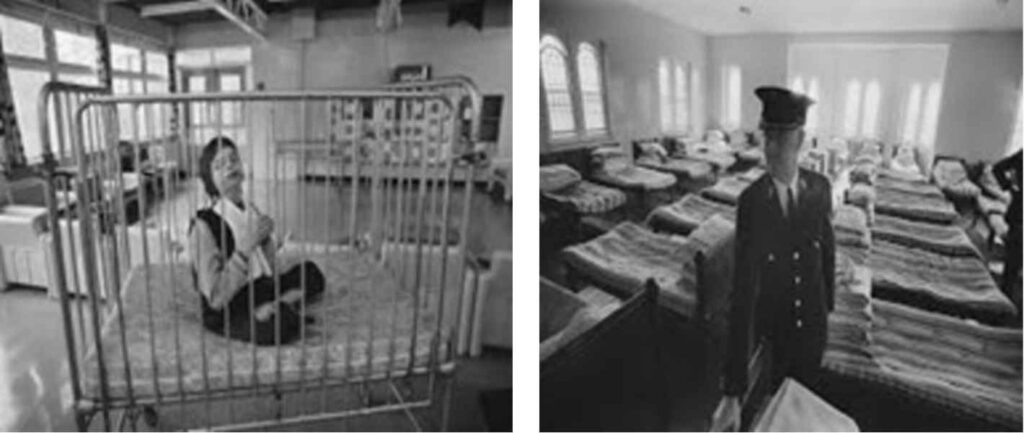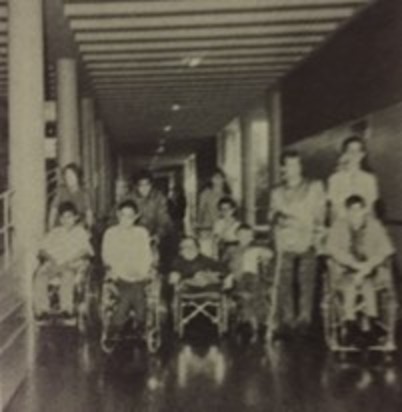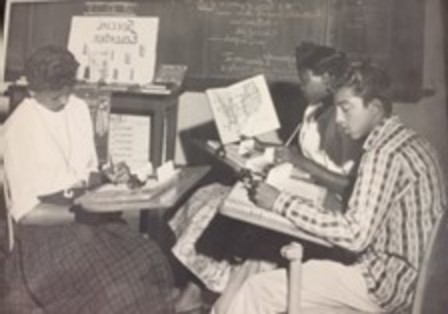
You have to know where you have been in order to know where you are going.
ADVOCACYDENVER was established May 12, 1954, by parents to address the lack of access for children with disabilities to public education and in-home supports. It is important to remember in 1954, 1964, 1974 and even into the 80’s parents of children with intellectual disabilities were encouraged to institutionalize their child. This article pays tribute to the parents before us; the parents who refused to institutionalize their child, the pioneers of inclusion.

Many children and adults with intellectual disabilities were cared for in overcrowded, understaffed institutions that isolated them from their families and communities. The first patient was registered in 1912 and by 1936 there were 260 patients. Ridge closed in 1990; the facility was demolished in 2007.
In 1928 going forward Denver Public Schools dabbled in providing school programming to some children with disabilities. In 1928 the first class for the deaf and hard of hearing established in Denver. 1948 Denver began two classes at Evans School for children with intellectual disabilities.

In 1952 the General Assembly passed the first major legislation for the education of children with disabilities. It included 5 categories: “aurally; educable mental; physically, speech and visually handicapped”. Colorado Law discussed, but did not guarantee or mandate the education of children with disabilities.
ADVOCACYDENVER was established May 12, 1954, by parents to address the lack of access for children with disabilities to public education and in-home supports.

The 1965 Handicapped Children’s Education Act of amendments added the category of “educationally handicapped”. Still, children with more significant disabilities were excluded and programming was contingent on space, funding availability of teachers or other professionals. The public law allowed school districts to maintain waiting lists for services.
Suit seeks education for handicapped
Rocky Mountain News Sat. December 23, 1972
“A suit was filed in Denver U.S. District Court Friday to demand from the state equal educational opportunities for some 20,00 physically and mentally retarded youngsters.”
The suit was filed by the Colorado Association for Retarded Citizens and 19 youngsters. . . Defendants include the State Department of Education, the State Board of Education, State Department of Institutions and 11 school districts. Among the examples cited in the suite are:
- An 11-year-old Denver boy with Down Syndrome who was refused admission to Denver Public Schools. His parents were paying tuition to Laradon Hall.
- A 9-year-old Denver boy with an IQ of 111 who is perceptually handicapped
- An 11-year-old Littleton girl who is epileptic and has an IQ of 90
- A 7-year-old Aurora boy with a visual perception limitation and a movement disability. He has an IQ of 115.
The suit asked for a declaration by the court that laws and rules denying an equal education to handicapped youngsters are unconstitutional and that officials be stopped from enforcing them.
1975 Public Law 94-142 Education for All Handicapped Children Act
The law supported more than 1 million children with disabilities who had been excluded entirely from the education system. The law also supported children with disabilities who had had only limited access to the education system and were therefore denied an appropriate education.
Guaranteed a “free, appropriate public education” to all children and youth with disabilities.
In 1986 the law was reauthorized and named the Individuals with Disabilities Education Act (“IDEA”). IDEA promised that children would be provided a free, appropriate public education in the least restrictive environment. In the 1980s, going forward much of the focus of child and family advocacy has been to ensure that children are in fact educated in the least restrictive environment. Arc of Denver’s Executive Director Marcia Tewell appropriately observed that decisions in relation to educational placement during the 80s and 90s were based on a list of historical labels like “educable/trainable/profound”. The Arc of Denver advocated children with disabilities participate in general education instruction with peers of the same age in their neighborhood school.
The Individuals with Disabilities Education Act was reauthorized and amended in 1990 and 1997.
In 1997 Congress said:
“To the maximum extent appropriate, children with disabilities will be educated with children who are not disabled, and special classes, separate schooling, or other removal of the children from the regular educational environment occurs only when the nature or severity of the disability is such that education in the regular classroom with the use of supplementary aids and services cannot be achieved satisfactorily”.
Over the next two decades child and family advocates worked with families and schools to demand the children with disabilities be included. April 10, 2018, AdvocacyDenver filed a systemic complaint against Denver Public Schools on behalf of five families. AdvocacyDenver asserted that the district failed to provide supplementary aids and services in regular education classes, other education-related settings, and in extracurricular and nonacademic settings, to enable children with disabilities to be educated with nondisabled children to the maximum extent appropriate. All five students were labeled as students with an intellectual disability. This was the first systemic complaint accepted by the Colorado Department of Education State Complaint Office. The investigation took almost 5 months. Students prevailed on all issues defined in the complaint. Four of the students were fully included in their neighborhood school/school of choice in elementary, middle and high school. One student graduated from high school in 2023. This systemic complaint resulted in a countless number of students across the district being afforded the opportunity to be educated in the same schools, same classrooms as nondisabled peers.
